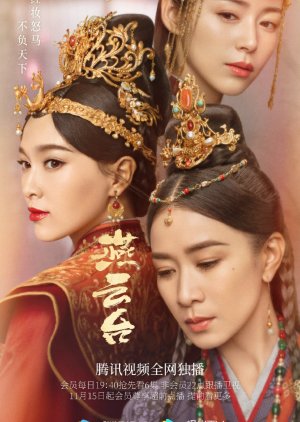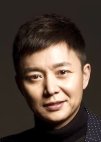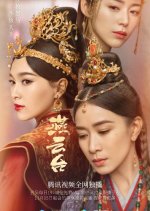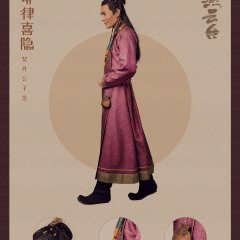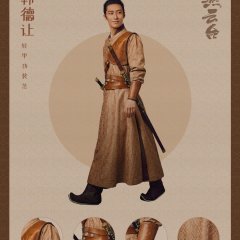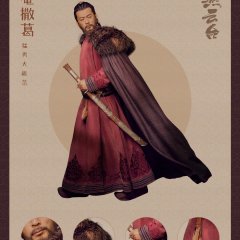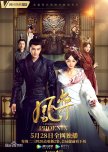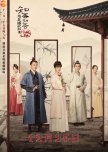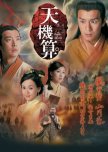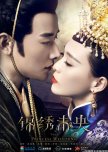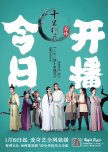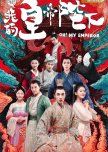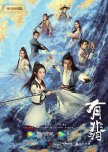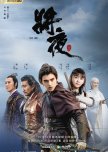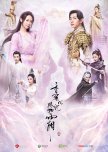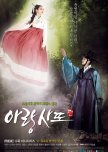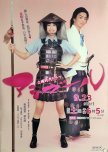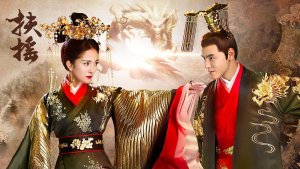 C-Drama Recommendations with "Legend" in the Title
C-Drama Recommendations with "Legend" in the Title É o fim do século X e a dinastia Liao está no auge do seu poder. Os Liao, poderosos, governam grande parte do que hoje é o nordeste da China, Mongólia e Rússia, assim como grande parte da península coreana. O primeiro-ministro, Xiao Si Wen, e a princesa Yan, dos Liao, têm três filhas, mas a favorita é a mais nova, a esforçada e diligente Xiao Chao. O coração da Xiao Chao pertence ao aspirante a comandante militar Han De Rang, cuja família serviu lealmente à família Liao por décadas. Mas seus pais têm outros planos para ela, e têm êxito na tarefa de arranjar seu casamento com o imperador de Liao, Jin Zhong. Ela obedece e se torna a rainha do imperador, além de uma defensora destemida dos Liao, ajudando a mobilizar o exército, liderando um regimento de cavalaria forte de 10.000 homens e fornecendo suporte à administração civil. Posteriormente, ela é intitulada imperatriz. Contudo, nesse meio tempo, Han De Rang prosseguiu com sua própria ascensão nas hierarquias, tanto militares quanto do governo, tornando-se um general e um ministro poderoso. Xiao Chao está preparada para fazer qualquer coisa para ajudar o reino... mas será que ela consegue conter seus sentimentos por Han De Rang? E ele, por sua vez, conseguirá controlar seu coração, que ainda bate por sua namorada de infância, agora a imperatriz? (Fonte: Viki) Editar Tradução
- Português (Portugal)
- Burmese
- Français
- Română
- Título original: 燕云台
- Também conhecido como: Yan Yun Tai , The Legend of Xiao Chuo
- Diretor: Jeffrey Chiang, Peng Xue Jun
- Roteirista: Jiang Sheng Nan, Chu Chu
- Gêneros: Ação, Histórico, Romance, Político
Onde assistir A Lenda de Xiao Chuo
Elenco e Créditos
- Tiffany Tang Papel Principal
- Shawn Dou Papel Principal
- Charmaine ShehXiao Hu NianPapel Principal
- Jing ChaoYelu Xian / Ming Yi / Emperor Jing Zong of LiaoPapel Principal
- Tan KaiYelu Yan Sa Ge / Prince Tai PingPapel Principal
- Liu Yi JunXiao Si WenPapel Principal
Resenhas

One step forward for mankind and two giant steps backwards for womankind.
This romanticized account of the life story of Xiao Yanyan, the accomplished Khitan Empress Chengtian (953-1009), gives voice to folk or unofficial history of her relationship with Han Derang. Wild history of their love affair survived over a thousand years and continues to fire the imagination of Chinese historians today.Please be aware of mild spoilers ahead (unless you already know the history).
It is known that Xiao Yanyan, was once engaged to Han Derang, who was from an elite Han Chinese family loyal to the Khitan rulers. According to the drama (which is based on a novel), her father chancellor Xiao Siwen and Han Derang help Mingyi (Emperor Jingzong) ascend the throne. Mingyi is sickly and his hold onto power is thus unstable; many branches of the royal family vie for the throne. Mingyi insists on marrying Yanyan so that like both his main rivals who married Yanyan's older sisters, his wife is also of royal bloodline. This kind of ill fated romance has limited appeal to most romance watchers and is an unnecessary digression for most historical or political drama buffs.
Although I was primarily interested in the history, Tang Yan and Dou Xiao's portrayal of the young lovebirds captured my heart and I was devastated by their forced separation. But alas their chemistry fizzles out later on in the drama and leaves me unconvinced that they are soul mates whose love is as deep or as epic as folk history suggests. At face, the bare facts are tantalizing - he shores up her regency over her young son Emperor Shengzong; is her trusted confidante and is highly ranked in her court; they may even have married and had a child together and; he was likely buried besides her. But in their more mature personas, both characters just seem sad, tired and lonely and not long lost soul mates who finally have their moment in the sun. It does not help that Tang Yan appears to have an easier, more natural chemistry with Jing Chao's Mingyi. To make matters worse, there are no nuances or subtleties in Yanyan's interactions with Mingyi and Derang that suggests they mean different things to her, that her relationship with and affection for each of them is not the same.
Mingyi is the most layered, complex and interesting character in this drama and probably one of the best grey characters I have seen this year. Although I resent his manipulation, his selfishness, his obscene sense of entitlement and his disingenuous excuses for doing terrible things, I also grudgingly empathized with him and the monumental task in front of him. Jing Chao really delivers one of the most convincing portrayals of a sociopath emperor who has the audacity to steal his best friend's fiancé and yet demands and expects them to protect his legacy. Unfortunately although she delivers a few good scenes, Tang Yan fails to evoke a strong and powerful empress who can rule alongside and then after the emperor. She cannot hold onto her strong moments, just defaults back to her comfort zone of a very beautiful and feminine woman that is to be rescued and protected. Her attempts at gravitas just results in a cold, aloof empress that doesn't allow any sparks to fly; even when she is free to be with the alleged love of her life. To be fair Tang Yan was pregnant during the shooting and that put limits on her ability to do the more physically challenging scenes but she still did not have to be written to be so mopey and passive aggressive.
The other magnificently and effortless acted role is Sheh Szeman's Xiao Hunian who is everything and more of what I imagined Yanyan would be. Her portrayal of a strong, yet feminine woman who bows to duty without wallowing in self pity; who is a fierce, strategic warrior that stands up to the menacing Yansage; who does as she pleases and shows her displeasure as effectively in words as in action puts Tang Yan's meek and insipid performance to shame. When Hunian tells Han Derang that it was just a twist of fate, else she would be just as great an empress, that resonates because art imitates life; a younger Sheh Szeman would have conveyed an unforgettable Xiao Yanyan. I did not approve of how the writing undermines Hunian in the final arc - even though Sheh Szeman got more airtime and had some awesome scenes, it was just not the right thing to do to the character.
While this drama as a whole does not live up to my expectations, I found many parts of it to be riveting. The power struggles and the battle for the throne are well written and shot but the story peaks at the Yansage arc. The battle footage and strategies used to route the enemy in this arc are bloodthirsty and exciting but is too early for the climax of the drama. To some extent that cannot be helped as it is the correct sequence historically. That said, after the Yansage arc, the focus of the story should shift from internal strife to external strife rather than focus on a series of much weaker, rather pathetic attempts at coups by the least interesting characters in the drama. It does little more than to drive home how hard it is for a widowed empress to hold on to the throne as regent without a strong military backer. It does highlight Han Derang's contributions and achievements as the unsung hero and the true power behind the Liao throne.
To me this is a 7.5/8.0 but I am going with 7.5 because I expected to watch a drama about a woman warrior who chose her country over her true love and then went on to make Liao great so that her sacrifice would be worth something. Instead, I may as well have watched her get her revenge on Mingyi by doing nothing besides get fat on sweet cakes and having flings with stable boys. But I learned many things about Liao/Khitan culture, including that Khitan women were very equal and progressive - they can get divorced, remarry if widowed, lead armies, hold positions and even rule in court. Which is really ironic because Mingyi's legacy Han reforms that were among Yanyan and Han Derang's greatest achievements basically Sinicized the nomadic Liao people to their vast benefit in terms of agriculture, language, culture and administrative and legal systems. But it also set Liao women back thousands of years in terms of the status and freedom. So what our warrior empress really achieved was one step forwards for mankind and two giant steps backwards for womankind. Maybe Tang Yan's portrayal wasn't that far off...
Could have been good. . .
At first glance: there's a great cast, an interesting story that's based off a preexisting work, actual historical persons who were legendary in their own rights, and a good quality budget. . .what could possibly go wrong, right??WARNING: Major Spoilers Ahead!!
I only give this story 3 stars because the cast tries really hard with a crap script. It wasn't horrific, it's just that as a viewer, there's definitely a need to suspend logic and intelligence.
The Legend of Xiao Chuo centers around the lives of the three Xiao sisters whose fates result in them eventually fighting against each other. The three are unfortunately married into the three controlling branches of the Liao Kingdom which equates to these three sisters becoming enemies since all their husbands want the crown. So. . .why exactly are these sisters so coveted??
Beats the hell out of me. Except for being descendants of the Empress' Xiao clan there's nothing remotely remarkable about any of the 3 sisters.
Eldest sister, Hu Nian (played by the wonderful Charmaine Sheh) is perhaps originally the best out of the three. She understands the political turmoil and tries to maintain neutrality because she knows getting involved could spell the death of her family. Second sister, Wuguli is materialistic and shallow, and despite being from a prominent political family, she is completely ignorant to everything that doesn't involve her. Lastly is our main lead: youngest sister, Yan Yan. Undoubtably the father's favorite (she gets away with everything she does), she apparently has the "destiny" of empress. She's the typical naive free spirit who's suppose to be clever, brave, and has a strong sense of justice. Unfortunately, this all falls really flat and she just comes off as super stubborn and reckless...she actually endangers her family in front of their psychotic and unstable monarch within the first 2 episodes of the show.
Her sisters are both claimed by 2 of the 3 branches while Yan Yan finds her own love interest in Han De Rang (Dou Xiao). Coincidentally, Han De Rang is a strong supporter of the 3rd power branch: Ming Yi, the son of the former emperor. Han De Rang and Ming Yi grew up together like brothers so the former pledges himself to Ming Yi's cause. As for Ming Yi, his father was killed by the reigning emperor therefore, he has a personal vendetta against the latter. When shit hits the fan and Ming Yi has the reigning emperor assassinated, he is crowned emperor and his first order of business?? . . .steal his best friend's girl! It totally makes sense to him. Knowing he's going to die "soon" (he survives until episode 42 of 48), he reasons that he needs a strong empress to fill his shoes with all the reforms he plans on enacting as ruler, it's just "pure coincidence" that he also has a thing for Yan Yan. Damn anyone he betrays or whose feelings are hurt by his decision, after all. . .as emperor, he has the right to do whatever.
Despite resisting initially, Yan Yan and De Rang eventually come to terms with their ill-fate and instead turn their attention towards bettering Liao Kingdom. Oh. . . but let's not forget the other 2 branches. Both are pissed off with their new ruler because each believe they are better suited to the position despite having no clear goals on how to help their people or how to make their kingdom flourish. . .it's all simply: "I'm entitled to the crown, so it must be mine"
The character-thin men aside, I really wish I could say the women were better. . . but no. I think the most frustrating part of this drama is: the characters do stupid things but they don't ever think they are wrong, and their reasons for justifying their actions? . . .just because. That's it.
Hu Nian and Wuguli's husbands rebel and plot against Ming Yi and Yan Yan ALL THE TIME, to the point of trying to hurt Yan Yan while she's heavily pregnant. Hu Nian and Wuguli are also ALWAYS preaching about the importance of their sisterhood. . .but those words only hold weight when it's Yan Yan who's striking back. When their husbands go after Yan Yan; they turn a blind eye, they don't even consider that she will die despite standing literally right next to Yan Yan when some of these events occur. But the minute Yan Yan tries to dole out justice/punishments for treason, both sisters are on their knees beseeching Yan Yan to show mercy...which she does continuously (for the sake of their sisterhood) only for the same results to happen AGAIN AND AGAIN. But because Yan Yan doesn't pardon the crimes the way her sisters want her to, it ignites a ridiculous antagonism
Hu Nian and Wuguli develop towards Yan Yan.
If there's something this drama does do well, it's victim-blaming and how it makes its characters despicable because they are all masters at emotional manipulation. Example: after Ming Yi succeeds in stealing Yan Yan, he implies to Yan Yan that her misery is her own fault and she could be happy if she accepted her destiny of being his empress early on..uh what?!
Ming Yi emotionally manipulates Yan Yan into staying married to him. Yan Yan and Ming Yi manipulate De Rang into not leaving them because without him, they both would've died many times over. Wuguli and Hu Nian manipulate and guilt Yan Yan into constantly forgiving treasonous crimes. Example: Wuguli tries to poison Yan Yan to avenge the deserved death of her idiot husband and son...only to be outed by De Rang. She takes her own life and as a result. . .Hu Nian blames Yan Yan and De Rang for not forgiving Wuguli's assassination attempt....which then causes Yan Yan to feel guilty about not letting her vile sister succeed in killing her. . . .what the what?! Where is this logic??
As I said above, Hu Nian was originally the best of the 3. Unfortunately, her character takes a turn for the worse and she became as bad as Wuguli. Her lover attempts to assassinate their emperor (aka her nephew) and not only does she spring him out of prison, she blames Yan Yan's thirst for power as the reason for his death ... huh? The sisters have such tunnel vision that they quite literally can't see anything beyond themselves. Everything that goes wrong in their lives is automatically Yan Yan's fault regardless of the treacherous nature of their lovers/husbands.
What should've portrayed the brilliance of women who led their kingdom to new heights devolved into a series with love-sick girls acting no better than children; who were also married to narrow-minded men. Despite the supposed message of feminism, this drama was anything but.
Such a waste in production value and a good cast.

